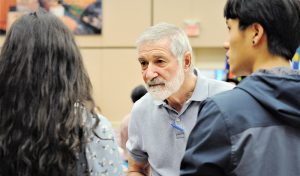Tina Turner, known around the world as the Queen of Rock, began her practice of Nichiren Buddhism in Los Angeles in 1973. This year marks Tina’s 60th year in the music industry and her 45th year of Buddhist practice.
During the course of her career, Tina has sold more than 200 million albums and singles worldwide, won eight Grammy Awards, received the Kennedy Center Honor for excellence in the arts, sold more tickets to her live concerts than any solo performer in music history and this year received the Recording Academy’s Lifetime Achievement Award.
In the past decade, Tina announced her retirement, became a Swiss citizen, married her longtime partner, Erwin Bach, and has co-created several interfaith music albums with her friend and fellow singer, Regula Curti, founder of the BEYOND Foundation, who joined our conversation.
Living Buddhism: Tina, thank you for sharing your thoughts with us. As an artist, you’ll always be thought of as the Queen of Rock. As a spiritual person, how do you want people to think of you?
Tina Turner: I have never separated my spiritual practice from my life as a rock singer. When I was going through the hardest times of my life, I was chanting Nam-myoho-renge-kyo. Chanting helped me and changed my life for the better. I’ve left a good body of work as a rock singer, and I’ve made it very clear that it was because of my spiritual practice.
Can you recall a point in the early days of your Buddhist practice when you realized, “This is it, this is the path for me to open my life”?
Tina: There was nothing miraculous happening overnight. When I was torn, in the hardest times of my life, I was chanting Nam-myoho-renge-kyo for several hours a day. And I saw it working. When I was faced with a challenging situation, the answers inside of me came forth and were right there when I needed them. My reactions were spot on, and I knew it came from that truthful place deep within, what we call innate Buddha wisdom. I slowly started to feel like myself again, and to have access to my true nature. Forty-five years of chanting has opened a door inside of me. Practicing Nam-myoho-renge-kyo puts me in another frame of mind, gives me clarity and wisdom. I am more in harmony with myself, and it helps me to make the right decisions.
The new stage production Tina: The Musical, based on your life, opened in London in April this year. What do you hope is the main message audiences will come away with from the musical?
Tina: We have been working on this new show for more than three years now. During that time, a lot of people have asked me why I wanted to make a musical. I always found it a little difficult to answer, because I didn’t want to make a musical! (Laughter) I’ve been blessed with a wonderful career, and after more than 50 years of performing, I don’t need a musical. But I get so many cards and letters—I still can’t believe how people feel about me onstage and the legacy they say I left. People tell me I gave them hope. It meant so much to so many people, I feel I must pass it on, and I hope this new show serves what people need, as a good reminder of my work and the message of my life.
Countless people have learned about Buddhism through your inspiring movie, What’s Love Got to Do With It. Can you remember a good story about people’s reactions when they saw the movie?
Tina: Yes, I remember a lot! Everybody knows that I practice Buddhism, thanks to my movie. I think I planted many seeds with it. One story I recall: I was going through an airport when my movie came out. And there was a man who yelled out to me from across the room. He said, “After seeing your movie, I will never beat my wife again!” So I could see from that interaction, Buddhism can even attract a person like that, someone who needs to correct their negative behavior or their negative life condition.
For someone who is just beginning to practice Buddhism, what would you say is the most important thing to keep in mind?
Tina: A good explanation of the words Nam-myoho-renge-kyo can help you to understand, but the sutra can only be fully appreciated through chanting it. The practice is to get you started twice a day, when rising in the morning and before retiring in the evening. It is a day-by-day, year-by-year process, until you get where you want to go. You will always find obstacles in your life, in your work, families and relationships. That’s life! We must constantly work to overcome those obstacles. That part will remain the same. What’s different for me today is that I handle my challenging situations not in an angry way but by solving problems as harmoniously as possible.
Given the great demands on your time throughout your career, what was the key to continuing to chant regularly, even when you were very busy on the road touring?
Tina: I just had to do it, because it changed my life so much for the better. The longer you walk on this path, the more you avoid making wrong decisions. The wisdom of the Lotus Sutra and my practice of it helped me to become strong and clear again in daily life. And my life has proven this.
SGI President Ikeda has likened chanting Nam-myoho-renge-kyo to a spiritual workout. You said you chanted hours a day early in your practice. That’s a serious workout routine! Has that routine changed over the course of your life?
Tina: Yes, as I mentioned earlier, during my hardest times in life, I chanted for four hours a day, in the morning and in the evening, and also when needed in the middle of the day. Now in retirement, I still chant Nam-myoho-renge-kyo each day but not as much as before. The practice for me these days gets me started well in the morning, and since I am happily retired, I sometimes even have the luxury of going back to sleep!
Your life story of triumph despite overwhelming circumstances inspires countless people. What advice can you share with people going through seemingly impossible circumstances in their lives today?
Tina: There is a way through every roadblock. But you must work hard to break through with the determination to “never give up” and to “make the impossible possible.” In the early days of my practice, we were taught the analogy of a hose for transforming one’s karma (see June 2018 Living Buddhism, p. 55).
Say that you have a hose that has been lying in a garden for a very long time, and mud and leaves and all kinds of dirty things have gotten into it. Then, when the water is turned on, at first all the mud and dirty slush come out from the hose. But if you keep running water through it, eventually the water coming out will be clean. That’s how the practice works—keep the water flowing.

Photo by Photo by Alain Benainous / Gamma-Rapho / Getty Images.
What are some of your favorite passages from Nichiren Daishonin?
Tina: “Suffer what there is to suffer, enjoy what there is to enjoy. Regard both suffering and joy as facts of life, and continue chanting Nam-myoho-renge-kyo, no matter what happens. How could this be anything other than the boundless joy of the Law?” (“Happiness In This World,” The Writings of Nichiren Daishonin, vol. 1, p. 681)
“Nam-myoho-renge-kyo is like the roar of a lion. What sickness can therefore be an
obstacle?” (“Reply to Kyo’o,” WND-1, 412)
And what are some of your favorite quotes from SGI President Ikeda?
Tina: “Life is painful. It has thorns, like the stem of a rose. Culture and art are the roses that bloom on the stem … The flower is yourself, your humanity. Art is the liberation of the humanity within you.” (Discussions on Youth, p. 171)
“It is much more valuable to look for the strength in others—you can gain nothing by criticizing people’s imperfections.” (Discussions on Youth, p. 102)
“A person who, no matter how desperate the situation, gives others hope, is a true leader.” (www.ikedaquotes.org)
How has your Buddhist practice shaped the way you approach obstacles?
Tina: Buddhism helped me to get out of a difficult situation and into a much better situation. It changed my life condition. I was born into a Baptist family, and I’d still pray the Lord’s Prayer. But Buddhism gave me other words, Nam-myoho-renge-kyo, another spiritual system, and it worked. It gives me the clarity and wisdom to change what is in my power to change.
The Buddhist concept of changing poison into medicine works. My life has proven it. I have learned to forgive and to embrace. Today I am a happy and better person. It still keeps me going day by day. However, you yourself must do it. “Keep singing … singing takes you beyond, beyond … ”

While you’ve retired from performing, you’ve been actively developing projects including Tina: The Musical in London, and creating BEYOND music together with your friend Regula Curti, who joins us now. What has been the focus of your creativity in recent years?
Tina: Unity! Music is an invitation to open one’s heart to others, beyond religions or belief systems, and become united. The spiritual messages I describe in our recent albums are meant to guide people into a place inside themselves where all differences fade.
I see my role as an inspiration for people to help themselves, as well as for me to help myself and increase comfort in my life, and to give something back to the world.
Regula Curti: The name for our music and foundation was inspired by this poem by Rumi: “Beyond right and wrong there is a field / I will meet you there.” We hope that our music is preparing that field of compassionate love to embrace all human beings beyond culture, belief, race and gender. Our mission is to unite cultures through music, to create cross-cultural understanding, awareness, dialogue and respect.
Buddhism was an important part of my life even before I met Tina in the late ’90s. By birth, it so happened that I grew up in a Protestant family, yet it was in part through my spiritual practice of Buddhism that I felt I found my direct connection to God, to the Universe.
What do you believe is the most important thing people, regardless of their religion, can gain from Buddhism?
Tina: What really matters is love and compassion for all living beings and to be kind to everybody. I believe one of the main problems we face today in the world is that many people are not in touch with true love. Many people have never experienced true love in their lives.
For example, when people are born unwanted by their parents, then from the start they are born into a negative situation. They may experience violence and abuse, so negativity seems normal to them and they are likely to go on to attract the same situation in relationships over and over again. Many people are pushed into such a place in their lives, without love and without trust. They are not taught that they can correct that side of themselves. Buddhism offers a method to clear the subconscious mind. Chanting Nam-myoho-renge-kyo changes negativity into positivity.
Regula: I believe Buddhist practice gives people peace of mind and the cultivation of wisdom and compassion. On the first album we made together, Tina speaks of this in her spiritual message: “We all need a repeated discipline, a genuine training to let go of our old habits of mind and to find and sustain a new way of seeing.” Buddhist practice clears our lives of wrong decisions and helps us to find our true nature.
We are living in a time of increased divisiveness. What do you feel people can do, across the religious spectrum, to help unify the world for peace?
Tina: The experience of singing prayers together in cross-cultural unity allows us to deeply connect on an emotional level—a place of love and respect where worldly differences fade. Music can build bridges between “you” and “me,” “us” and “them.” I feel strongly that it is time for the world to move beyond division into greater spiritual connection.
Regula: Build bridges! Our modern world gets more and more divided. What divides us is our ego. Create peace within yourself! That’s where it all starts. Cultivate a compassionate loving personality and live it within your families, with your neighbors and friends.
You both live in Switzerland, a land known for peace. How does your Swiss environment affect your work?
Regula: Tina often says that Switzerland is a very spiritual place. It’s a safe and peaceful country with ethical values. Tina and I believe we’re fortunate to live in such a place, which is open to the world and welcomes people from other countries, cultures and spiritual traditions. We also feel a sense of responsibility to give back. That’s where the energy for our interfaith projects comes from.
We’re proud that our BEYOND music albums are developed in Switzerland, yet we intend our work to be a global exchange for like-minded artists to meet and collaborate for world peace. We wish for our work to be a celebration of the universal power of music to bring people together, promoting togetherness and compassion, and helping people realize that we, humanity, are one team.
On September 23, 2018, the youth of the SGI-USA will host the Lions of Justice Festival to unite 50,000 young people of all backgrounds who are striving for a society of justice, peace and respect. What inspirational message would you like to share with these young people?
Tina: Work on yourself to become a kind and loving person. Respect all people. Chanting will help you to think and act correctly, to become clear and develop peace. Build bridges and help others. Remember President Ikeda’s words: “People can only live fully by helping others to live. When you give life to friends you truly live. Cultures can only realize their further richness by honoring other traditions. And only by respecting natural life can humanity continue to exist” (“The Sun of Jiyu Over a New Land,”
My Dear Friends in America, third edition, p. 211).
Regula: In our foundation’s cross-cultural programs with young people, we use the powerful quote (often attributed to Mahatma Gandhi), “Be the change you wish to see in the world.” I hope this message of wisdom will resonate with everyone who participates in the Lions of Justice Festival.
Tina, you always seem to have an ageless spirit. What do you think are key ingredients for remaining youthful throughout life?
Tina: Singing and dancing helped me to stay young and vibrant. But I also have very good genes, and I take good care of myself. And a positive attitude toward life is important. As President Ikeda says: “Youthfulness is not determined by age. It is determined by one’s life force. One who possesses hope is forever young. One who continually advances is forever beautiful” (www.ikedaquotes.org).
Finally, how would you describe the vast range of your life’s journey?
Tina: I took all the challenges as they were, and I overcame them. My life is a love story!
You are reading {{ meterCount }} of {{ meterMax }} free premium articles





